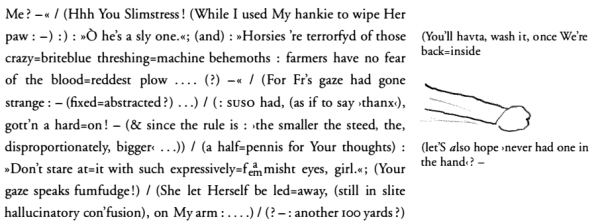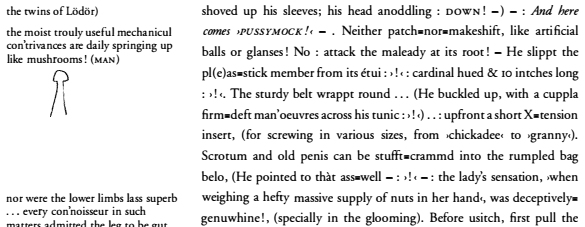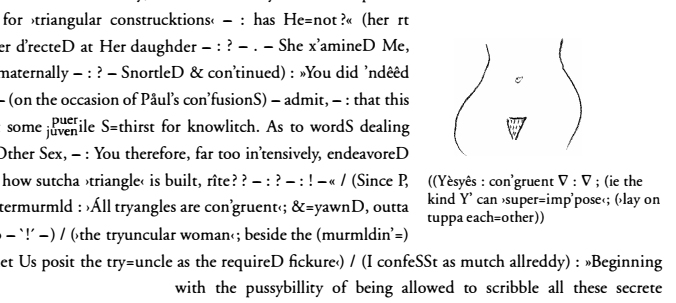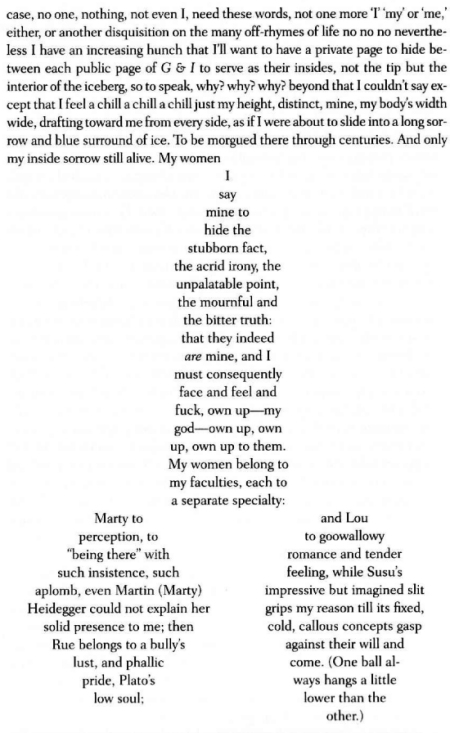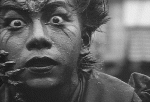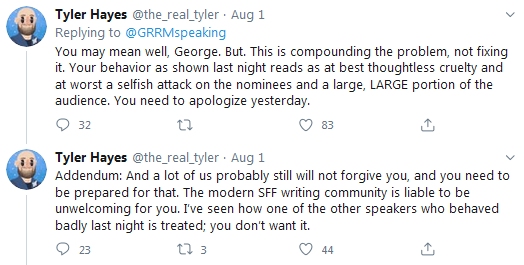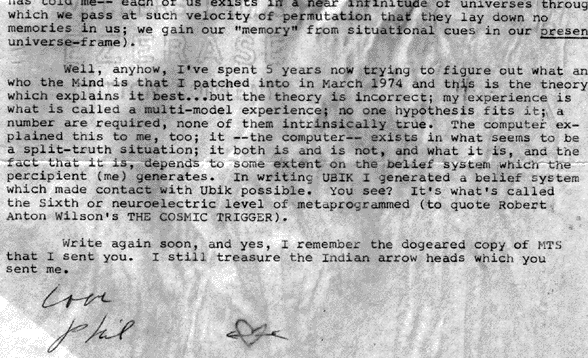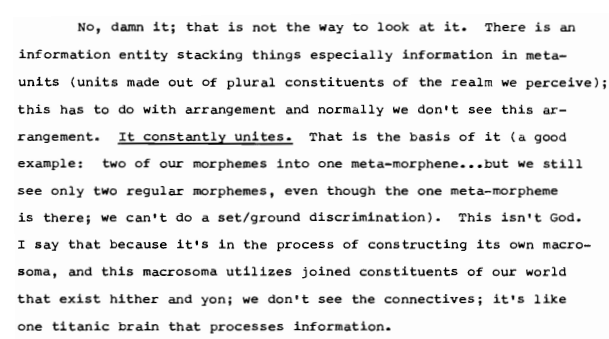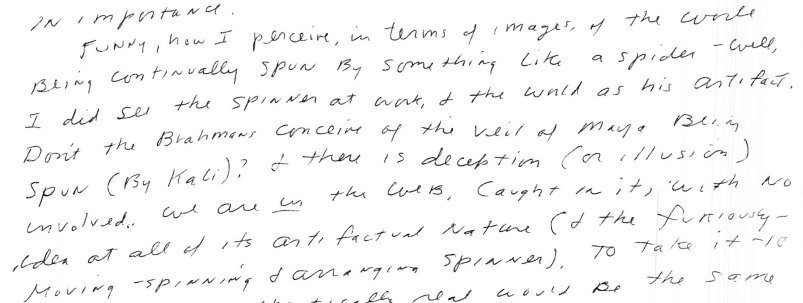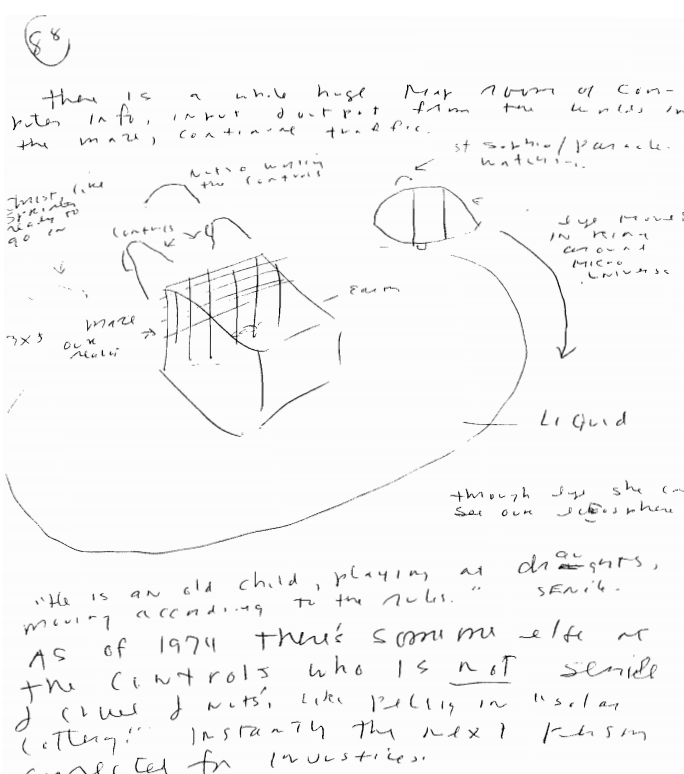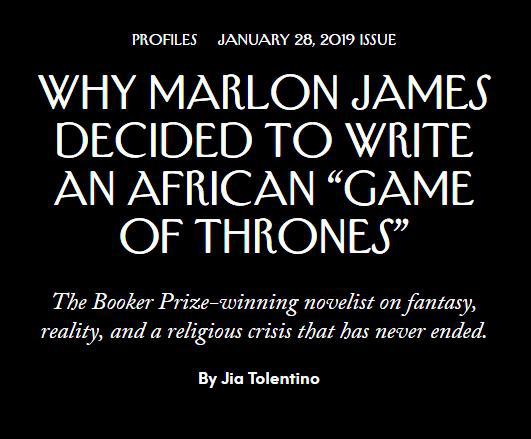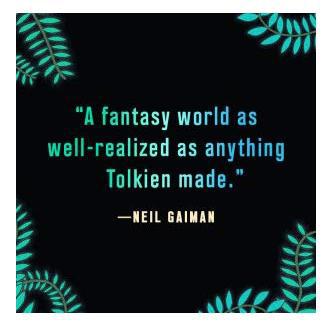Annette said, “I suppose Louis Manfreti will represent the Skitz clan again this year. I always enjoy him; he has such interesting things to tell, the visions he sees of primordial things. Beasts from the earth and the sky, monsters that battle under the ground…” She sucked on a piece of hard candy thoughtfully. “Do you think the visions that Skitzes see are real, Gabe?”
“No,” Baines said, truthfully.
“Why do they ponder and talk about them all the time, then? They’re real to them, anyhow.”
“Mysticism,” Baines said scornfully.
(tired now, will revise tomorrow)
The structure of the Exegesis is a bit of a mess and, from what I know, done posthumously (the division in folders) without any discernible logical sense. So there’s no straightforward way to go in. Since I don’t have any better alternative I’ll stick with the published book, that supposedly rearranges the folders in chronological order. So my current plan is to follow the published sequence and integrate the original material where there are parts that are cut.
It starts with folder 4, at some point during 1974, and my source also starts from the same point. So I’ll go with the book.
This project is supposed to be ongoing without any planned regular frequency. I expect it to continue very, very slowly, but hopefully without huge delays. It’s just one side activity. Even if I only end up reading 1% of the whole thing, that’s fine. I only want to avoid being stuck at some point for a long time.
At the beginning I expect to spend a lot of time commenting details. As things become established and more redundant I’ll probably read a lot more and write a lot less. But for now it will be maximalist commentary.
So here we go.
—–
Ubik takes the stage and without any sort of premise Dick plunges in the deep end. We’re already into metaphysics and abstract interpretation from the first line.
He says (in Ubik) time stops but “changes” are produced. We’ll get back to this apparent contradiction. The idea is that once time, as a force, becomes weaker and stops, something happens: “the bare bones, so to speak, of the world, our world, are revealed.” And: “The press of time on everything, having been abolished, reveals many elements underlying our phenomena.”
Since I’ve read further than this, I already know that what Dick is doing here isn’t giving a metaphysical/fictional context to Ubik, but equating what happened in Ubik to his own mystical experience, that is at the core of the whole Exegesis. So everything he affirms about Ubik generally applies to what he experienced. Lets say it is being “retconned.” Ubik is used as a translator of that experience, transforming a “feeling” into rational knowledge, an understanding. That’s our context here.
One idea here is of a layer of reality. Something happens, and the curtain drops, you get a glimpse of a beyond. But Dick is sure this beyond isn’t another curtain, or at least not yet. There’s a certain philosophical foundationalism, the idea of seeing a more foundational reality. Not just another one, but one that is truer.
If time stops, this is what takes place, these changes.
Emphasis mine. Time stops, but change happens. This appears as a contradiction, since usually time is required for change to appear. Dick is only highlighting this.
Not frozen-ness, but revelation.
If we imagine the illusion of reality as a movie, then the time stopping is like a projector, the medium that builds the illusion. This still requires to step outside, otherwise you still wouldn’t notice (as Dick confirms later).
In the introduction to the other post, if you look at the top of that first image, you can see Dick presenting an idea where consciousness exists in a sort of multiverse, where it is plunged at a great speed through different lives. Memories are only built through cues, as if they are inferences. So it’s as if it is time that makes it possible to build a world as we know it. The moment time stops it’s like all the paintings (meaning) we hanged on that framework fall apart. The “bare bones”.
We can then extrapolate through what he says that “time” is a positive force. He says other things related to entropy I can’t quite get. Things cool, forms regress. How? In what way? Action, obviously related to time, is tied to “a form of heat.” Of course it isn’t possible if time stops.
He continues describing the “Logos” and the “Holy Spirit”. The Logos is essentially the fabric of the world (the world beyond the world). The wider foundation. So the Logos is also outside time, since time is only one force within reality. The Holy Spirit is a kind of force too, so it is contained, somewhat internal to the Logos. The Holy Spirit is the “last station” of time. The omega point in the direction of time, the final point of that trajectory. In Dick’s scheme, then, the Holy Spirit stands at the far right, intending that the arrow of time intuitively goes from left to right, along its conventional progress.
Due to its nature also as a kind of force, the Holy Spirit doesn’t quite wait there at the end, but “overcomes the time field and flows back against it.” So it moves in a trajectory opposite to that of time. It’s coming our way. “It is the anti-time.”
Then he makes a few distinctions. The Logos comes right from the outside (above), the Holy Spirit is instead within, also within time and “is moving: retrograde.” The “real universe” is eternity. Logically since we already established fundamental reality comes in the form of the Logos, and the Logos is placed outside time itself. Outside time is eternity. The Holy Spirit, then, behaves like tachyons, as if we are in Watchmen. In the comics it is what allowed Dr. Manhattan experience time in a weird way. Dick subscribes to this possibility of tachyons.
Up to this point everything seems to follow, somewhat. But then he says a form of equilibrium is achieved because the Logos operates in three vectors: from behind, from above, and from ahead. This also seems to follow, the force from behind is time (causal), from left to right, the force coming from ahead is the Holy Spirit, as described, and the force from above is the Logos. Well yes, it’s a bit abstract. Why above and not below? Why a direction? The Logos is supposed to be the “Atman, everywhere.” It is pervasive, the fabric itself.
*NOW* equilibrium is being lost because as time weakens there’s an increasing “retrograde teleology.” The Holy Spirit, I guess. It is inversely causal. But why the norm should be “equilibrium” if the normality is the flowing of time? It should mean that in general the force of time is at least stronger than the retrograde force of the Holy Spirit. Or time would be completely stalling, not moving forward not backwards. Here I began to think there was something missing in all this description, a kind of secret sauce. Dick is precisely describing metaphysics but it looks like hand waving if there isn’t a description of what these forces do, why they behave they way they do. Actors set up on the stage, but not causal. This is doing this, but how, why?
We get a handy example. He says it’s like some space travel from a planet to another. So you can make a distinction between three phases. The first is when you are under the force of the gravity of the planet of origin, a second phase when the gravity pull between the two is equal, and a final phase when you move into the gravitational force of the destination planet. Seen subjectively from the spaceship that is doing this journey.
Through this, the Holy Spirit, as the destination (and force with its own purpose), “corrects” and “completes.” I cannot avoid interpreting this other than Kabbalistic terms. These are spiritual terms. But it’s not simple to conform these with a more technical example (nothing has been described as incomplete or incorrect).
He then explains that when he wrote Ubik he built a world with just one difference from ours, a world without the forward moving force of time. But in the first line he actually wrote that “time ceased”, not that it was absent. In any case he points this out to make a distinction. When he wrote Ubik he simply came up with this concept of a fictional world, “now” he is instead persuaded that time has ACTUALLY “begun to weaken.” If before he thought of time as subjective perception, now he externalizes it, and makes the weakening of time an universal event. And since this is now “true”, and not a fictional conceit, then it can be experienced.
I have indeed had that experience, or a measure thereof.
In another letter, Dick writes (the part scribbled by hand):
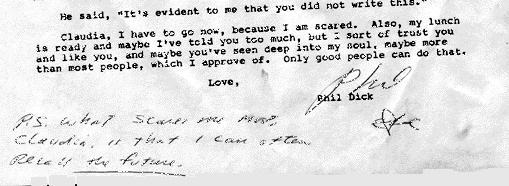
What scares me most, Claudia, is that I can often recall the future.
As a kind of self-fulfilling prophecy, the theme of Ubik eventually came to be. As if Ubik itself was informed from the future.
Flipping forward a page, taken from a letter to someone else, Dick explains he really bought into this concept of tachyons “flying in a reverse time direction.” Therefore “carrying information from the future into our present.”
“In the light of these developments, we can no longer exclude on a priori grounds the theoretical possibility of precognitive phenomena.” so forth (Harper’s, July 1974).
…He’s quoting a magazine. Bad science has always been bad science.
So, jumping back to where we left, Dick expects that “material (information) from the future leaking or bleeding back to us.” I really like this materialistic slant. Information is somewhat solid (even metaphysically), that’s actually good. And then he also describes another effect that is very Dick-ian, I like this too: “abrupt lurches back on our part to recent prior time periods, like a needle on a record being anti-skated back to a prior groove.”
The latter we would not be consciously aware of.
And that’s the part Dick does best, and conforms to my dear Blind Brain Theory. Perception is a trick, it needs information on the absence of information to know that something is missing. If we don’t have memories, then we don’t perceive change. We could wake up every day in a completely different reality and not notice anything weird. Our inferences are contextual, as he properly defined in that excerpt I mentioned above.
My doubts above were due to the fact that stepping from one boundary of reality (like a curtain) to the next requires perception. We aren’t in the objective perspective of the Logos “from above.” We are subjectively caged. So not only Dick hypothesizes that time might stop, but that somehow subjective consciousness (experience) moves on independently from time (not bound by it). As a sort of Wile E. Coyote that continues to run even if the ground is not there anymore. Isn’t time a necessary vehicle for perception? Somehow Dick believes they are on independent tracks. The absence of time doesn’t freeze perception as one would intuitively believe (see above “not frozen-ness”, it only warps it.
Yet he’s not completely outside what I’m saying, as right here he describes how he also conceives perception in the exact same way: those other “lurches through time” are not perceived, simply because we have no knowledge of them.
Highlighting that the other event, of material from the future showing up, would be instead visible. Because that material “is not by us but to us.” It’s existing information we cannot account for, but that is there. A scientific proof (in the pure sense of its existence outside subjectivity).
If you cannot experience the time skips, instead, you cannot prove them either. They simply don’t exist, that’s all. Metaphysically (but also materialistically), one is generally bound to the layer of reality he belongs to. You cannot simply shuffle the soul back and forth. Unless you use the magical sauce.
He concludes this section by explaining that the event he experienced wasn’t an “intellectual inference”, it wasn’t specifically rational. It was a perception, a sort of feeling that he tried to pinpoint and rationalize after the fact. He labeled it. He “felt” it was both “alive” and “holy.” But in the way of sensations, not concepts. As if he’s trying to logically rebuild a platonic ideal abstraction into a logical recreation, as faithfully as possible. He also didn’t experience that phenomenon as appearing to him, but being it. Being the Logos. He was subjectively perceiving the Logos as the Logos would perceive itself if it had subjectivity.
More accurately, not the Logos itself, but the Holy Spirit, since he specifies it came from the future. Dick argues this, ultimately settling on the fact that the Logos and the Holy Spirit are semantic distinctions. And yet he highlights that he’s certain it came from the future. That part not being semantic, but faithful to the feeling itself. I can only wonder “how”, but that’s what Dick says.
I like how he concludes, in a sort of self-observing loop:
From within me, as part of me, it looked out and saw itself.
He both “saw and became” (the philosophical sense of being). So both in and out. Both subject and object. System and environment.
I’ll add myself: also, he either was informed from the future when writing Ubik, too, or he was able to win the Magical Belief Lottery. How probable can be that a fictional concept you imagine not only becomes somewhat plausible, but also manifests right TO YOU. Of course this is also logically possible, within a certain metaphysical frame. As long Dick was precisely chosen. That information from the future just couldn’t be framed as a spontaneous natural phenomenon… precisely happening to you. Unless you also add some form of retrocausal teleology, that we see is also part of all this.
The bottom line is that Dick describes this as a self-sustaining, let’s say self sufficient, explanation. I instead think it needs a lot of other stuff if it wants to hold up, logically. Too many missing pieces. Too vague.
I’ll conclude tying up the gap to the letter that follow and that I already mentioned, when he explains about the tachyons and the possibility of “precognitive phenomena.”
He continues saying that for several months he’s been experimenting. Because of something else he read while researching “A Scanner Darkly.” Something about the possibility that the brain can “transduce external fields” under certain special conditions. One of which was “vitamins in megadosages.”
…Of course Dick being the fool that he is put this right into practice.
I began attempting, on the basis of what I knew, to bring on both the hemispheres of my own brain using the recipe for megadoses of the water soluble vitamins
Well, thankfully they were only water soluble ones.
Water IN-soluble vitamins are those that get absorbed and then stored in the body, so taking large doses with a certain frequency can become a real health risk, exactly because they get accumulated and become toxic. It’s a very bad idea.
On the other hand water soluble ones, as the term says, simply end up being pissed away when the body absorbs too much, before they can do damage.
I guess Dick ended up going to the bathroom more frequently, with this ill informed “experiment.”

